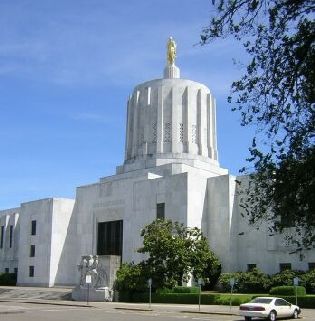
Publisher:
Bonnie King
CONTACT:
Newsroom@Salem-news.com
Advertising:
Adsales@Salem-news.com

~Truth~
~Justice~
~Peace~
TJP
Nov-24-2009 12:13

 TweetFollow @OregonNews
TweetFollow @OregonNews
Experts Debunk Claim That Tax Measures Would Cost Jobs
Salem-News.comTax Policy Center calls arguments "misleading" and "fatally flawed".
 Oregon state capitol Photo by Tim King Salem-News.com |
(SILVERTON, Ore.) - The central argument by opponents of Measures 66 and 67, that the measures will cause Oregon to lose jobs, is "without merit," according to experts at the Urban-Brookings Tax Policy Center. They said the claim rests on "misleading analysis" and "fatally flawed assumptions."
 Randall Pozdena |
 William Conerly |
The Washington, D.C.-based center picked apart the work of Oregon economists Randall Pozdena and William Conerly, who have argued that raising taxes on high-income Oregonians and corporations would cause the state to lose tens of thousands of jobs. Opponents of Measures 66 and 67 -- funded by banks, big corporations and rich individuals -- have added together the upper limits of Pozdena's and Conerly's estimates and trumpeted the total as the centerpiece of their campaign.
"The Tax Policy Center's analysis shows that the campaign against Measures 66 and 67 is relying on phony job numbers shoddily cooked up by hired-gun economists," said Chuck Sheketoff, executive director of the Oregon Center for Public Policy. "No matter how many times they are repeated, the job-loss claims aren't worth the paper they are printed on."
OCPP requested the analysis by the Tax Policy Center, a joint venture of the Urban Institute and the Brookings Institution. The center is staffed by nationally recognized experts in tax, budget and social policy who have served at the highest levels of government.
Tax Policy Center co-director Roseanne Altshuler and senior associate Kim Rueben conducted the analysis. A former professor of economics at Rutgers University and former editor of the National Tax Journal, Altshuler has served on a presidential tax reform panel and advised congressional committees and foreign governments on tax matters. Rueben is an adjunct fellow at the Public Policy Institute of California and specializes in issues of state and local public finance.
Altshuler and Rueben concluded that Pozdena, a senior economist at the ECONorthwest consulting firm, "wrongly" based his job-loss estimate on an international study of the impact of corporate tax changes. Not only are the findings of that study "irrelevant" in the case of industrialized countries such as the U.S., but they are inapplicable to corporate tax changes at the state level.
The tax policy experts also criticized Pozdena for failing to take into account the economic impact of losing federal dollars, a likely outcome should the tax measures fail at the ballot box. Without the revenue from the tax measures, Oregon would be forced to cut spending, which in turn would deprive the state's economy of federal matching funds.
Other economists have similarly noted the importance of federal dollars. They include 36 Oregon economists who issued an open letter in October endorsing the tax measures and economists at the nonpartisan Oregon Legislative Revenue Office.
Altshuler and Rueben also reviewed and rejected the claims by Conerly, a self-employed consulting economist and chair of the board of Cascade Policy Institute, who has argued that raising Oregon's top marginal income tax rate on wealthy Oregonians would lead to job losses. They noted that a 2005 analysis by the Tax Policy Center's then co-director Len Burman had shown that Conerly's economic model employed "fatally flawed assumptions."
"Burman knew better than anyone that Conerly's model was defective because, among its faults, Conerly's analysis misrepresented Burman's own research," said Sheketoff, who in 2005 asked Burman to review the Conerly model.
At the heart of Conerly's current job-loss claim is the assumption that taxes harm the business climate, a supposition rejected by the Tax Policy Center experts. As did Burman, Altshuler and Rueben said that a state's attractiveness to individuals and businesses depends on many factors, including the quality of public services. "To thrive, businesses and Oregon families need good schools, job training programs, small-business support centers, courthouses that are open Monday through Friday, cops on the beat and many other public structures," said Sheketoff. "Protecting public structures that Oregonians and businesses rely on every day is the goal of Measures 66 and 67. It's why Oregonians need to vote 'yes' in January."
Without the revenue raised by the measures, the Oregon legislature in all likelihood would be forced to cut education, public safety and health and human services, which together make up about 93 percent of the state's General Fund budget. The fiscal shortfall caused by the recession has already forced cuts in those three areas.
The measures "are reasonable responses to the unprecedented drop throughout the nation in state tax revenues due to recent economic crisis," Altshuler and Rueben said. "We believe these measures will help ensure that Oregon has sufficient revenue to maintain essential services including spending on education and health care."
Sheketoff hoped that the Tax Policy Center's analysis would prompt voters and the media to scrutinize more closely the claims made by the "no" campaign.
"The stakes are very high in this election," said Sheketoff. "Oregonians need to base their vote on the facts, not numbers trumped-up for the benefit of the big business lobby."
===========================================
Source: Oregon Center for Public Policy, a non-partisan research institute that does in-depth research and analysis on budget, tax and economic issues.
Articles for November 23, 2009 | Articles for November 24, 2009 | Articles for November 25, 2009
Quick Links
DINING
Willamette UniversityGoudy Commons Cafe
Dine on the Queen
Willamette Queen Sternwheeler
MUST SEE SALEM
Oregon Capitol ToursCapitol History Gateway
Willamette River Ride
Willamette Queen Sternwheeler
Historic Home Tours:
Deepwood Museum
The Bush House
Gaiety Hollow Garden
AUCTIONS - APPRAISALS
Auction Masters & AppraisalsCONSTRUCTION SERVICES
Roofing and ContractingSheridan, Ore.
ONLINE SHOPPING
Special Occasion DressesAdvertise with Salem-News
Contact:AdSales@Salem-News.com

googlec507860f6901db00.html



Terms of Service | Privacy Policy
All comments and messages are approved by people and self promotional links or unacceptable comments are denied.
Roger Miles November 30, 2009 6:55 pm (Pacific time)
Salempappy we already carry more of a tax burden. Go look up who pays a disproportionate amount of taxes, both federal and state. Many small and medium business owners file not as a corporation but as an individual taxpayer. They will get the shaft big time and they have a lot of employees who will be joining the unemployed ranks. That proverbial straw is landing on all kinds of employers everyday out there. What we need is a responsible budget on all level of government. Look at some states like California, New York and New Jersey, they have every kind of tax and fee that you can think of and still they're nearing bankruptcy. More taxes has never been the answer for it stifles growth. Best way to increase revenue for the government is to keep taxes reasonable and to follow a responsible budget.
SalemPappy November 26, 2009 9:32 pm (Pacific time)
I'm voting to keep the tax increases. If you make over $125,000 per year ($250,000 as a couple), you should carry more of the tax burden.
stephen November 24, 2009 6:32 pm (Pacific time)
Oregon reader: lol :-) u r correct, look up
Ersun Warncke November 24, 2009 8:13 pm (Pacific time)
It isn't hard to debunk a model based prediction of the future economic impacts of any policy decision. Future predictions are always guesses, it doesn't matter what model you use. What should be remembered, with reference to my article on this issue, is that these tax raises would with absolute certainty put Oregon citizens and businesses at a competitive disadvantage with out-of-State investors and big national chain retailers. It should be understood that in "market democracy" the goal of people who pay lobbyists is to insure that every proposed piece of legislation will be in their benefit whether it passes or not. Lobbyists cannot always achieve this goal, but that is their goal. This is why every major donor gives pretty much equally to both political parties. These tax bills are a perfect example of how the largest donors will benefit either way. The status quo is to their advantage. If the bill passes, they get slightly higher taxes, but they seriously undermine competition from small businesses at the same time. In either case, the largest players win. I recommend rejecting these measures, because they are not the end of the story. If they are rejected, then the legislature has to come back with a better proposal.
Lyle November 24, 2009 6:06 pm (Pacific time)
NO NEW TAXES is pretty much the way things will go in the upcoming election. Even Obama during his campaign said it would be stupid to raise taxes during a recession. Though Oregon has been voting down these kinds of taxes long before he was born. It's time to live within a budget.
Oregon Reader November 24, 2009 12:37 pm (Pacific time)
It just goes to show that if you want an opinion bad enough, you can pay for one from someone with a PhD!
[Return to Top]©2025 Salem-News.com. All opinions expressed in this article are those of the author and do not necessarily reflect those of Salem-News.com.